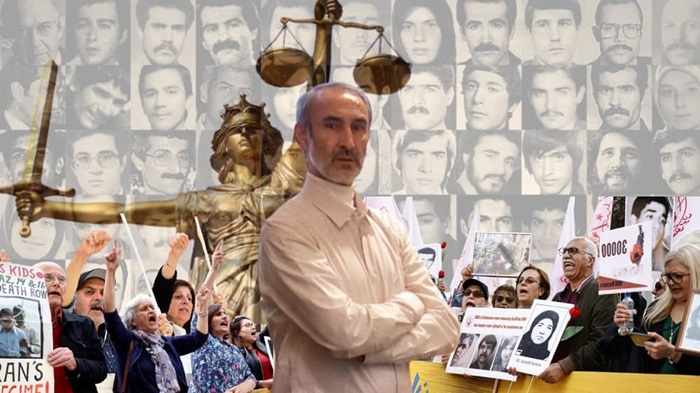
The Swedish Court of Appeals marked its eighteenth day of hearings in the trial of Hamid Nouri, with the final defense presented by Kenneth Lewis, representing plaintiffs associated with the People’s Mojahedin of Iran (PMOI/MEK).
Nouri, a former torturer and prison guard for the Iranian regime, is implicated in the mass killings of political prisoners in 1988, predominantly PMOI members and supporters. Lewis endorsed the district court’s decision for Nouri’s life sentence, citing substantial evidence of his criminal activities corroborated by his clients’ testimonies. He argued against categorizing the PMOI-Iran regime conflict as an international armed conflict, emphasizing its non-international nature. The conflict, he noted, began on June 20, 1981, with the regime’s brutal suppression of peaceful protests and mass executions, prompting the PMOI’s shift to armed resistance.
Lewis discredited misinformation presented in court about PMOI-Iraq relations, attributing it to individuals like Rouzbeh Parsi, reportedly enlisted by the Iranian regime to influence European perspectives. He challenged Anthony Cordesman’s allegations against the PMOI, citing inconsistencies and lack of credible sources.
Mr. Kenneth Lewis, a Swedish-#American lawyer who has been assisting the #IranianResistance for more than 2 decades, explained in detail how the MEK has been moving heaven and earth to shed light on the crimes of the clerical regime's officials in the #1988Massacre and bring them… pic.twitter.com/t4Bv3TodRP
— NCRI-FAC (@iran_policy) July 24, 2023
The defense detailed the PMOI’s criticism of Iraqi missile attacks on Iranian cities, as reported by The Washington Post in 1988, and debunked claims of their financial and military dependence on Iraq. Lewis cited a Kuwaiti newspaper article and statements from an Iraqi general, affirming the PMOI’s independent operations during the Iran-Iraq war.
Highlighting the PMOI’s financial autonomy, Lewis presented banking documents and mentioned a “Mojahed Magazine” issue, showcasing the organization’s self-sufficiency. He also referenced CIA reports and UN correspondence, further substantiating the PMOI’s independent status and ongoing conflict with the Iranian regime beyond 1988.
Watch our roundup on #FreeIran2023 World Summit discussing #1988Massacre– Part 1
Featuring speeches from @BoumedraTahar, Joachim Rücker and Kenneth Lewis pic.twitter.com/UtbfeO2fOz— NCRI-FAC (@iran_policy) August 2, 2023
Lewis traced the roots of the PMOI-Iran regime conflict to the early days of the Islamic revolution, emphasizing the organization’s rapid growth and the regime’s violent crackdown on June 20, 1981. This date marked a pivotal shift from peaceful to armed resistance by the PMOI. He recounted the regime’s widespread executions, including the massacre of PMOI members and supporters, citing former political prisoner Mohammad Zand’s accounts of mass executions in Evin Prison.
Lewis underscored the significance of Khomeini’s fatwa in 1988, leading to mass executions of political prisoners, particularly PMOI affiliates. He dissected the fatwa’s text, highlighting its alignment with the definition of genocide, based on religious beliefs and views opposing the clerical dictatorship.
In July and August 1988, over 30,000 political prisoners were massacred in Iran’s prisons.
Ebrahim Raisi, #Iran’s current president, was a key member of the “Death Committee”. Raisi is a mass murderer, and the international community must hold him to account. #MEK pic.twitter.com/jjxJqkkUgS— NCRI-FAC (@iran_policy) July 29, 2022
The defense provided a comprehensive overview of the PMOI’s history, from its formation and resistance to the Iranian regime’s relentless assaults, including international incidents in Pakistan and Iraqi border areas. He criticized the inadequacies in presenting facts about the PMOI’s role during the Iran-Iraq War and their non-international armed conflict status.
Concluding, Lewis reaffirmed the ongoing non-international armed conflict between the PMOI and the Iranian regime, stressing its persistence even after 2003, despite the PMOI’s disarmament. His presentation challenged conventional narratives and sought to clarify the historical and ongoing dynamics between the PMOI and the Iranian regime.
#Iran News in Brief
Amidst growing global and social pressure, Shahab al-Din Haeri Shirazi, a defected cleric inside Iran, broke his silence to admit to the execution of 30,000 political prisoners during #1988Massacre. https://t.co/aPf6Xora9k pic.twitter.com/IDIWCM9CDX— NCRI-FAC (@iran_policy) August 25, 2023

MEK Iran (follow us on Twitter and Facebook), Maryam Rajavi’s on her site, Twitter & Facebook, NCRI (Twitter & Facebook), and People’s Mojahedin Organization of Iran – MEK IRAN – YouTu
